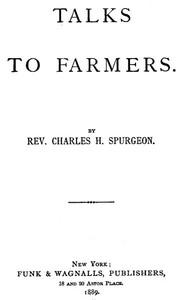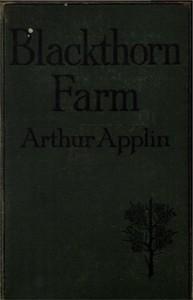|
|
Read this ebook for free! No credit card needed, absolutely nothing to pay.Words: 94667 in 13 pages
This is an ebook sharing website. You can read the uploaded ebooks for free here. No credit cards needed, nothing to pay. If you want to own a digital copy of the ebook, or want to read offline with your favorite ebook-reader, then you can choose to buy and download the ebook.

: Talks to Farmers by Spurgeon C H Charles Haddon - Sermons English 19th century; Baptists Sermons@FreeBooksWed 07 Jun, 2023 are slothful, friend, look over the field of your heart, and weep at the sight. Let every deacon, every class-leader, and also every minister enquire diligently into the state of the field he has to cultivate. You see, brothers and sisters, if you and I are set over any department of our Lord's work, and we are not diligent in it, we shall be like barren trees planted in an orchard, which are a loss altogether, because they occupy the places of other trees which might have brought forth fruit unto their owners. We shall cumber the ground, and do damage to our Lord, unless we render him actual service. Will you think of this? If you could be put down as a mere cipher in the accounts of Christ, that would be very sad; but, brother, it cannot be so, you will cause a deficit unless you create a gain. Oh that through the grace of God we may be profitable to our Lord and Master! Who among us can look upon his life-work without some sorrow? If anything has been done aright we ascribe it all to the grace of God; but how much there is to weep over! How much that we would wish to amend! Let us not spend time in idle regrets, but pray for the Spirit of God, that in the future we may not be void of understanding, but may know what we ought to do, and where the strength must come from with which to do it, and then give ourselves up to the doing of it. I conclude by remarking that THERE MUST BE SOME LESSON IN ALL THIS. I cannot teach it as I would, but I want to learn it myself. I will speak it as though I were talking to myself. God grant that we may not be left to prove what nature will produce if left to itself. "Surely you do not object to my having a little more sleep?" says the sluggard. "You have waked me so soon. I only ask another little nap." "My dear man, it is far into the morning." He answers, "It is rather late, I know; but it will not be much later if I take just another doze." You wake him again, and tell him it is noon. He says, "It is the hottest part of the day: I daresay if I had been up I should have gone to the sofa and taken a little rest from the hot sun." You knock at his door when it is almost evening, and then he cries, "It is of no use to get up now, for the day is almost over." You remind him of his overgrown field and weedy vineyard, and he answers, "Yes, I must get up, I know." He shakes himself and says, "I do not think it will matter much if I wait till the clock strikes. I will rest another minute or two." He is glued to his bed, dead while he liveth, buried in his laziness. If he could sleep forever he would, but he cannot, for the judgment-day will rouse him. It is written, "And in hell he lift up his eyes, being in torment." God grant that you spiritual sluggards may wake before that; but you will not unless you bestir yourselves betimes, for "now is the accepted time"; and it may be now or never. To-morrow is only to be found in the calendar of fools; to-day is the time of the wise man, the chosen season of our gracious God. Oh that the Holy Spirit may lead you to seize the present hour, that you may at once give yourselves to the Lord by faith in Christ Jesus, and then from his vineyard-- "Quick uproot The noisome weeds, that without profit suck The soil's fertility from wholesome plants." THE BROKEN FENCE. THIS slothful man did no hurt to his fellow-men: he was not a thief, nor a ruffian, nor a meddler in anybody else's business. He did not trouble himself about other men's concerns, for he did not even attend to his own--it required too much exertion. He was not grossly vicious; he had not energy enough to care for that. He was one who liked to take things easily. He always let well alone, and, for the matter of that, he let ill alone, too, as the nettles and the thistles in his garden plainly proved. What was the use of disturbing himself? It would be all the same a hundred years hence; and so he took things just as they came. He was not a bad man, so some said of him; and yet, perhaps, it will be found at last that there is no worse man in the world than the man who is not good, for in some respects he is not good enough to be bad; he has not enough force of character about him to serve either God or Baal. He simply serves himself, worshipping his own ease and adoring his own comfort. Yet he always meant to be right. Dear me! he was not going to sleep much longer, he would only have forty winks more, and then he would be at his work, and show you what he could do. One of these days he meant to be thoroughly in earnest, and make up for lost time. The time never actually came for him to begin, but it was always coming. He always meant to repent, but he went on in his sin. He meant to believe, but he died an unbeliever. He meant to be a Christian, but he lived without Christ. He halted between two opinions because he could not trouble himself to make up his mind; and so he perished of delay. This picture of the slothful man and his garden and field overgrown with nettles and weeds represents many a man who has professed to be a Christian, but who has become slothful in the things of God. Spiritual life has withered in him. He has backslidden; he has come down from the condition of healthy spiritual energy into one of listlessness, and indifference to the things of God; and while things have gone wrong within his heart, and all sorts of mischiefs have come into him and grown up and seeded themselves in him, mischief is also taking place externally in his daily conduct. The stone wall which guarded his character is broken down, and he lies open to all evil. Upon this point we will now meditate. "The stone wall thereof was broken down." You will see that in the beginning it was a very good fence, for it was a stone wall. Fields are often surrounded with wooden palings which soon decay, or with hedges which may very easily have gaps made in them; but this was a stone wall. Such walls are very usual in the East, and are also common in some of our own counties where stone is plentiful. It was a substantial protection to begin with, and well shut in the pretty little estate which had fallen into such bad hands. The man had a field for agricultural purposes, and another strip of land for a vineyard or a garden. It was fertile soil, for it produced thorns and nettles in abundance, and where these flourish better things can be produced; yet the idler took no care of his property, but allowed the wall to get into bad repair, and in many places to be quite broken down. Let me mention some of the stone walls that men permit to be broken down when they backslide. We are not bigots, but we should be none the worse if we so lived that men called us so. I met a man the other day who was accused of bigotry, and I said, "Give me your hand, old fellow. I like to meet with bigots now and then, for the fine old creatures are getting scarce, and the stuff they are made of is so good that if there were more of it we might see a few men among us again and fewer mollusks." Lately we have seen few men with backbone; the most have been of the jelly-fish order. I have lived in times in which I should have said, "Be liberal, and shake off all narrowness": but now I am obliged to alter my tone and cry, "Be steadfast in the truth." The faith once delivered to the saints is now all the more attractive to me because it is called narrow, for I am weary of that breadth which comes of broken hedges. There are fixed points of truth, and definite certainties of creed, and woe to you if you allow these stone walls to crumble down. I fear me that the slothful are a numerous band, and that ages to come may have to deplore the laxity which has been applauded by this negligent generation. Free books android app tbrJar TBR JAR Read Free books online gutenberg More posts by @FreeBooks
|
Terms of Use Stock Market News! © gutenberg.org.in2025 All Rights reserved.






